Troops Leaving Service Find New Purpose on the Farm
Transitioning back to civilian life can be a challenge for service members. This agricultural bootcamp helps veterans cultivate new beginnings and find opportunities in farming and food.
Troops Leaving Service Find New Purpose on the Farm
Transitioning back to civilian life can be a challenge for service members. This agricultural bootcamp helps veterans cultivate new beginnings and find opportunities in farming and food.
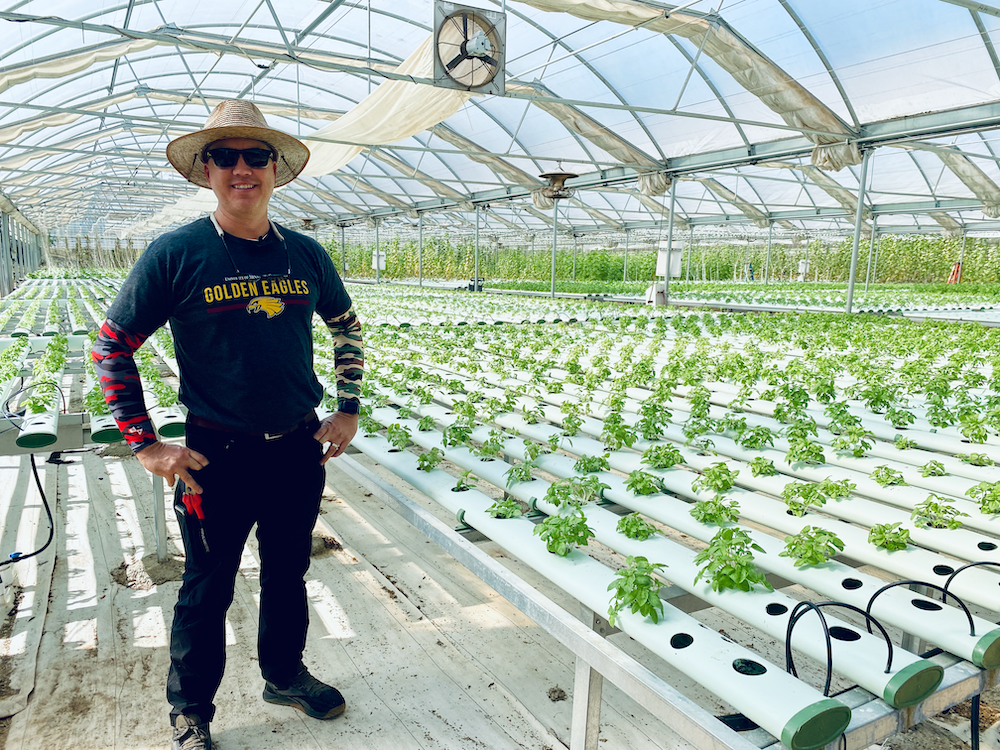
Tony Lattner, AiSA’s director of education, in the Archi’s Acres greenhouse.by Naoki Nitta.
Within months of joining the U.S. Marine Corps, Colin Archipley was headed to war. “He went right from bootcamp to Iraq,” spending seven months on the front lines, says his wife Karen, referring to the 2003 US-led military invasion. After a half-year return to Camp Pendleton near San Diego, he repeated the cycle twice: a deployment to Fallujah followed by a brief reprieve back in California, and then a final tour in Haditha, just as Iraq’s western province became a hotspot.
Suffering from severe post-traumatic stress, Archipley was ready to retire after his four-year enlistment. “You don’t come back without damage from that,” says Karen. Yet checking out of the armed forces, the couple came to find, was a shockingly abrupt procedure with scant support. At that time, the Department of Defense’s (DoD) Transition Assistance Program, which was developed in 1991 to smooth the shift from active duty to civilian life, extended just four days. “It was harsh,” she says. They were left to navigate a lot on their own, including finding doctors familiar with combat-related conditions while trying to secure appointments at the Veterans Administration—on top of figuring out Archipley’s next career step.
Fortunately, the couple had invested in a 2.5-acre farm in Escondido, near Camp Pendleton, in between tours. “Farming turned out to be really healing,” says Karen, allowing her husband to decompress outdoors through physically demanding but rewarding challenges. After ending his service in 2006, Archipley and his wife established Archi’s Acres, an organic hydroponic farm that supplies basil and other specialty crops to local restaurants and stores.
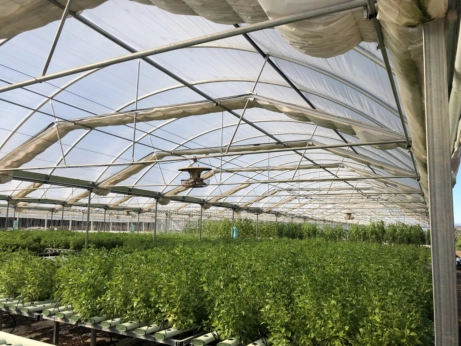
With the successful launch of the business and a renewed sense of purpose, the couple looked to extend their reach. In 2007, they established the Veteran’s Sustainable Agriculture Training program, since renamed as Archi’s Institute for Sustainable Agriculture (AiSA), an agricultural training program designed to transition active and former armed force members into growers. Like a boot camp of sorts, the six-week intensive program immerses students in all aspects of sustainable farming and entrepreneurship and ushers them into viable, agriculture-based careers.
Along the way, it’s also become a platform—one that the Archipleys have leveraged to advocate for stronger government support in transitioning troops out of uniform.
A mission-driven attitude
In recent years, the unemployment rate among veterans has dipped dramatically, generally falling below the national rate. But, according to a study commissioned by the Office of the Secretary of Defense (OSD), historically, vets under the age of 24 have faced higher rates, which hit 29 percent in 2011. The gap closes quickly, however, with age and time out of uniform, the report suggests, and with proper education and training, former service members are quick to overcome skill deficits.
“[Those] leaving the military need a new purpose,” says Jeanette Lombardo, executive director of Farmer Veteran Coalition. The non-profit organization supports veterans in their transition to agricultural careers and provides tuition grants to several training programs, including AiSA. The armed forces instill “grit and a mission-driven attitude,” she says, so the challenging nature of farming—the weather, pests and disease, the market—is often a good fit.
Service members also tend to be well versed in technology, Lombardo notes, making skills such as piloting drones readily transferable to the climate-smart and precision ag sectors. And disabled veterans are just as capable, she adds, particularly in marketing, logistics, distribution and compliance. “It’s a huge talent pool.”
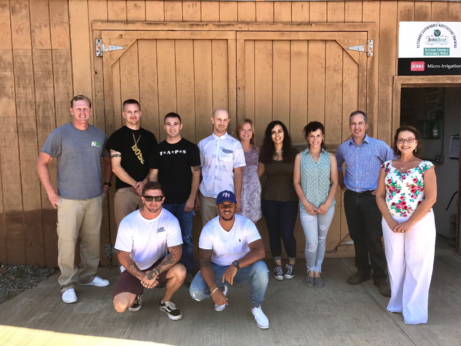
The armed force’s emphasis on leadership training also helps stoke an entrepreneurial spirit. With a full military career under their belt, “many vets want to be their own boss,” says Tony Lattner, AiSA’s director of education and a retired Marine, “or [move on to] some type of supervisory role.” He notes that of the 600 or so program graduates, more than two-thirds either own their own farm or business or manage an operation.
Along with teaching agronomics, soil health and sustainable farming practices, AiSA places a big emphasis on developing an agriculture-related enterprise. Over six weeks, the curriculum covers the full seed-to-market process including access to financing, food safety and building a business plan around a farming operation. The program, which is also open to civilians, moved completely online in 2020 during the COVID-19 pandemic to better accommodate service members spread throughout the world. (Local students still have the option of additional, on-site training.)
The class culminates in a final exam and a Shark Tank-style pitch to a jury of food professionals, industry leaders and investors. In addition to farming, graduates have gone on to launch successful ventures such as a chain of empanada stores in San Diego and a custom meat-processing facility serving small-scale ranchers in Lancaster, Kentucky.
The fast pace translates to three hours of classes twice a week and around five hours of daily reading and assignments. “It’s like a full-time job,” says Arlet Galindo, a current student. A human resources specialist in the Air Force, she’d been stationed in Turkey for her final assignment and has been juggling her studies while settling into life back home in Los Angeles. But organization, structure and time management come with the territory, she says. “That’s the military mentality—you just have to get it done. Failure is not an option,” she adds with a laugh.
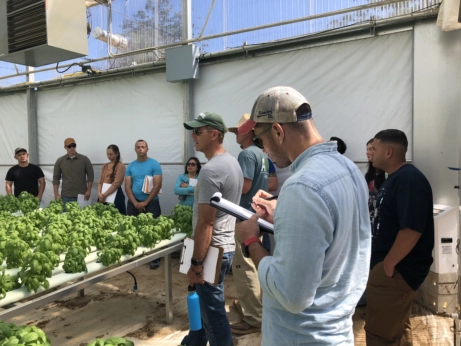
Galindo is one of a number of students in the 15-person class attending the course through SkillBridge, a DoD career transition program. Established in 2011, it allows service members to acquire civilian work experience through training, internships and apprenticeships during the final 180 days of their enlistment. Although the positions are unpaid, troops are relieved of their military duties and receive pay and benefits throughout the transition period.
The scaffolding is essential to post-service success, says Karen Archipley. Before SkillBridge, troops were being pushed out of the military with little civilian experience and a lot of vulnerability. “People often took any job they could get because they had families to support or medical needs to cover,” she says, recalling an early AiSA graduate who attended the class while homeless. In 2013, in a plea to bolster career transition support for veterans, the Archipleys presented his story and other similar cases to then-OSD director Frank DiGiovanni—leading the White House to later recognize their efforts.
A new call to service
In 2016, AiSA became a college credit program through Cal Poly Extended Extension, a move that allowed service members to tap their GI Bill benefits for tuition. But as of last year, a new partnership with the University of Minnesota Crookston gives program graduates a fully accredited agricultural certificate—a credential that equates to a year’s worth of working experience when applying for the USDA’s Farm Service Agency’s (FSA) Beginning Farmer loan.
Along with helping students leverage their military background to access capital, the program also emphasizes market viability. As a course requirement, students submit a comprehensive business plan at the end of the term—one that can be handed over to a loan officer or used to attract investors. “The whole idea is that their [venture] is sustainable, both financially and resource-wise,” says Lattner, the educational director. “If you have to get a second job to run the farm, it defeats the purpose.”
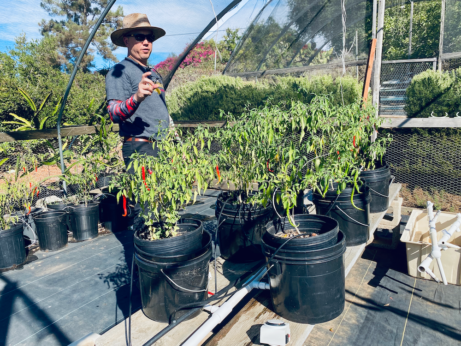
Samantha Stephens, a recent AiSA graduate winding down a decade-long career in the Marines, was startled to find out what it would take to run her husband’s family ranch in Georgia. While the mother of two—with a third on the way—will concentrate on parenting for the next few years, the couple’s long-term plan is to expand the two-acre llama, goat and sheep farm to include cows, chickens and a greenhouse. Understanding the breadth of compliance, taxes and regulations “opened my eyes to how much we’ll need to produce to justify doing the business,” she says.
Still, students see their service background as an apt segue to farming. There are obvious parallels in decision-making and prioritization, says Grant Taute. The current student and Osprey pilot is hanging up his wings after 20 years in the Marine Corps to become an avocado and specialty crop farmer outside of San Diego. Despite a very different professional pace, he says, the process is similar. “Whether it’s water, time or money, you constantly have to decide, ‘how am I going to best expend this resource?’”
And, ultimately, many service members see farming as yet another calling. Erick Raymundo-Vidrio, an aircraft technician retiring from a seven-year career in the Air Force, is planning to start a container farm. By bolstering food security for his community, he says, “I still feel like I’m answering a call to serve. Just at a smaller scale.”
Follow us

This work is licensed under a Creative Commons Attribution-NoDerivatives 4.0 International License.
Want to republish a Modern Farmer story?
We are happy for Modern Farmer stories to be shared, and encourage you to republish our articles for your audience. When doing so, we ask that you follow these guidelines:
Please credit us and our writers
For the author byline, please use “Author Name, Modern Farmer.” At the top of our stories, if on the web, please include this text and link: “This story was originally published by Modern Farmer.”
Please make sure to include a link back to either our home page or the article URL.
At the bottom of the story, please include the following text:
“Modern Farmer is a nonprofit initiative dedicated to raising awareness and catalyzing action at the intersection of food, agriculture, and society. Read more at <link>Modern Farmer</link>.”
Use our widget
We’d like to be able to track our stories, so we ask that if you republish our content, you do so using our widget (located on the left hand side of the article). The HTML code has a built-in tracker that tells us the data and domain where the story was published, as well as view counts.
Check the image requirements
It’s your responsibility to confirm you're licensed to republish images in our articles. Some images, such as those from commercial providers, don't allow their images to be republished without permission or payment. Copyright terms are generally listed in the image caption and attribution. You are welcome to omit our images or substitute with your own. Charts and interactive graphics follow the same rules.
Don’t change too much. Or, ask us first.
Articles must be republished in their entirety. It’s okay to change references to time (“today” to “yesterday”) or location (“Iowa City, IA” to “here”). But please keep everything else the same.
If you feel strongly that a more material edit needs to be made, get in touch with us at [email protected]. We’re happy to discuss it with the original author, but we must have prior approval for changes before publication.
Special cases
Extracts. You may run the first few lines or paragraphs of the article and then say: “Read the full article at Modern Farmer” with a link back to the original article.
Quotes. You may quote authors provided you include a link back to the article URL.
Translations. These require writer approval. To inquire about translation of a Modern Farmer article, contact us at [email protected]
Signed consent / copyright release forms. These are not required, provided you are following these guidelines.
Print. Articles can be republished in print under these same rules, with the exception that you do not need to include the links.
Tag us
When sharing the story on social media, please tag us using the following: - Twitter (@ModFarm) - Facebook (@ModernFarmerMedia) - Instagram (@modfarm)
Use our content respectfully
Modern Farmer is a nonprofit and as such we share our content for free and in good faith in order to reach new audiences. Respectfully,
No selling ads against our stories. It’s okay to put our stories on pages with ads.
Don’t republish our material wholesale, or automatically; you need to select stories to be republished individually.
You have no rights to sell, license, syndicate, or otherwise represent yourself as the authorized owner of our material to any third parties. This means that you cannot actively publish or submit our work for syndication to third party platforms or apps like Apple News or Google News. We understand that publishers cannot fully control when certain third parties automatically summarize or crawl content from publishers’ own sites.
Keep in touch
We want to hear from you if you love Modern Farmer content, have a collaboration idea, or anything else to share. As a nonprofit outlet, we work in service of our community and are always open to comments, feedback, and ideas. Contact us at [email protected].by Naoki Nitta, Modern Farmer
November 10, 2023
Modern Farmer Weekly
Solutions Hub
Innovations, ideas and inspiration. Actionable solutions for a resilient food system.
ExploreExplore other topics
Share With Us
We want to hear from Modern Farmer readers who have thoughtful commentary, actionable solutions, or helpful ideas to share.
SubmitNecessary cookies are absolutely essential for the website to function properly. This category only includes cookies that ensures basic functionalities and security features of the website. These cookies do not store any personal information.
Any cookies that may not be particularly necessary for the website to function and are used specifically to collect user personal data via analytics, ads, other embedded contents are termed as non-necessary cookies.
Sounds great, hope to see many more of these nationwide.
SOY VETERANO DESABILITADO VOLVI A PUERTO RICO . AQUI TODO ES MUY DIFICIL , EN TODO ABUNDA LA CORRUCION , HASTA EN LOS SERVICIOS AL VETERANO. EN EL HOSPITAL DE SAN JUAN ECISTE ESTRE PROGRAMA ELLOS LO AUSPICIAN COMO TERAPIA , NOS BEN COMO UNA ENTRADA DE DINERO MAS PORS EL HOSPITAL. El LUGAR ESTA PARA MI A UNA HORA DEL HOSPITAL , HAY QUE CUBRIL LOS GASTOS DE DE TRAMPORTACON Y UTILISAR NUESTROS AUTOS PARA TRAMPORTAL ALGO SI ES NECESARIO EN TODO ESTOS MESES ( 13 ) SOLO E VISTO UNA COCECHA DE LECHUGA, HATA AHORA ASIDO FUSTRANTA PARA… Read more »
These organizations are very needed and helpful. In Kansas, we have SAVE Farm® – Servicemember Agriculture Vocation Education Farm. The transitioning servicemen and women learn- beekeeping, row crop management, livestock. Classroom of 40 hours credit for ag marketing and so many other courses. The Veterans Admin. recognizes these as vital in PTSD recovery. Great article!
This sounds like a fantastic program. I am curious how the Archipleys found funding for it in the early years? It must have been difficult to get a program like this off the ground.
This is very inspiring.